by Jennifer Svetlik
Nearly 350 people gathered for Mosaic Mennonite Conference’s annual Assembly on November 2 at Souderton (PA) Mennonite’s meetinghouse. Guided by the theme “Walk Humbly with God,” and the text of Micah 6:8, the day opened with worship and opportunities to fellowship and make connections (a report on all the Assembly’s activities is available here).
During the morning session, 170 delegates from congregations and Conference-Related Ministries (CRMs) engaged in conversation and shared communion. They welcomed and prayed for three new Mosaic member congregations (Ark of Christ [Westminster, CA], Bethel Worship and Teaching Center [Levittown, PA], and Resplandece Mennonite [Pembroke Pines, FL and Barranquilla, Colombia]) and one Conference-Related Ministry (CRM) (The Worm Project). In the afternoon session, delegates voted on a ballot item focused on Mosaic’s relationship with Mennonite Church USA (MC USA).
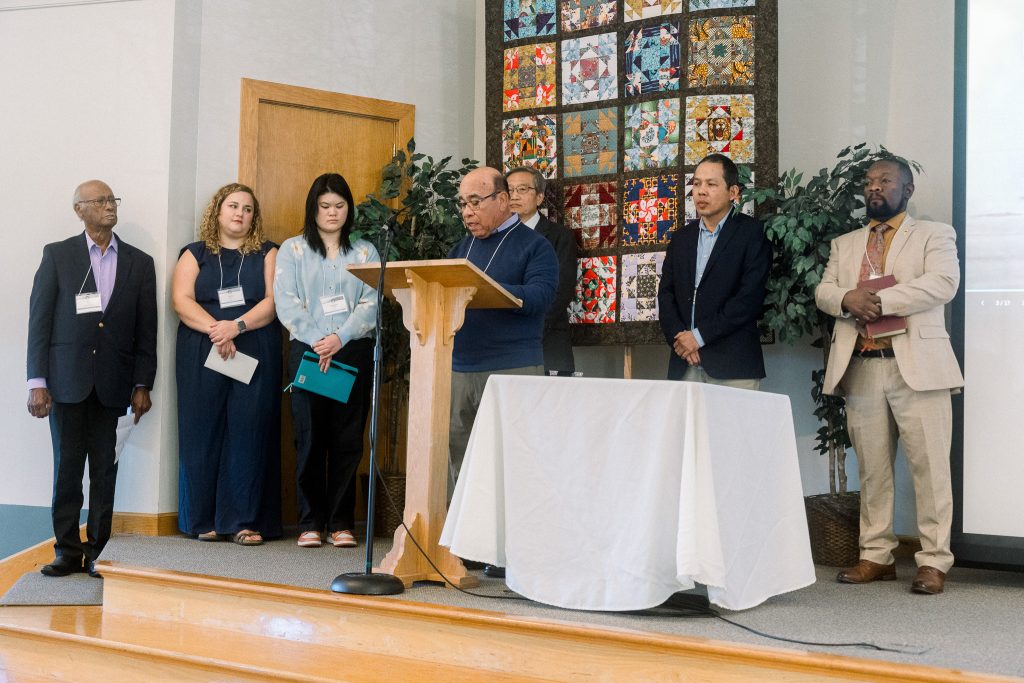
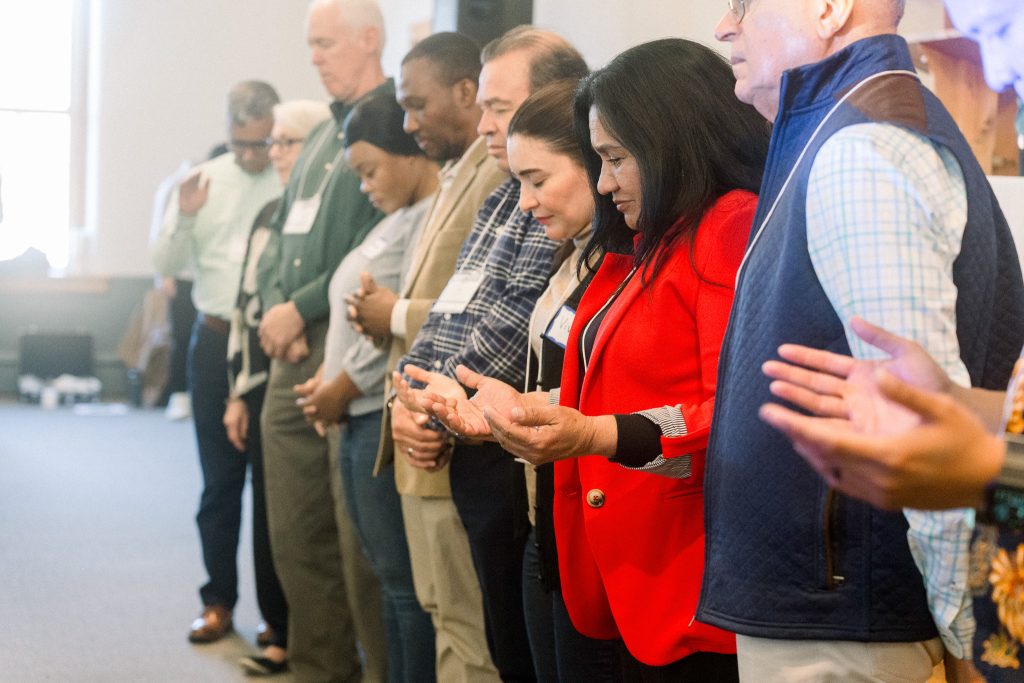
Among the guests that were present were Jon Carlson, Moderator for Mennonite Church USA (MC USA); Glen Guyton, Executive Director of MC USA; Michael Danner, Associate Executive Director for Church Vitality of MC USA; Camille Dager, Chief Communication Officer for MC USA; Wil LaVeist, Senior Executive of Advancement of Mennonite Mission Network; Amy Gingrich, Executive Director of MennoMedia, and Leonard Dow, Vice President of Community and Church Development of Everence. There were guests and delegates from 12 U.S. states, Mexico, and Colombia.
In the afternoon delegate session, Mosaic Conference’s Associate Executive Minister Marta Castillo and Leadership Minister for Intercultural Transformation Danilo Sanchez shared about Mosaic’s Strategic Plan for 2025-2027, which is the primary outcome of a two-year strategic planning process led by Mosaic’s Pathway Steering Team, and the Vibrant Mosaic Program. Delegates offered verbal and written engagement with the plan within their table groups.
Executive Minister Stephen Kriss opened the presentation on the Pathway Steering Team’s recommendation of partnership, rather than membership with MC USA. He led with a time of prayer and a recognition that “this has not been an easy time” within the life of Mosaic.
“For some of us, [the relationship with MC USA] is a sacred relationship, for others it is a challenge. For some of us the relationship is new and undefined… For some it represents family, generations, and connections that go beyond this space and this time,” Kriss said.
When addressing the leaders of MC USA, Kriss said, “I repent of any sense of arrogance in our conversations together,” and regarding what may happen after the vote, regardless of outcome, he said, “We commit to trying to work this out… We will work in good faith and a sense of openness. I will work with a sense of vulnerability.”
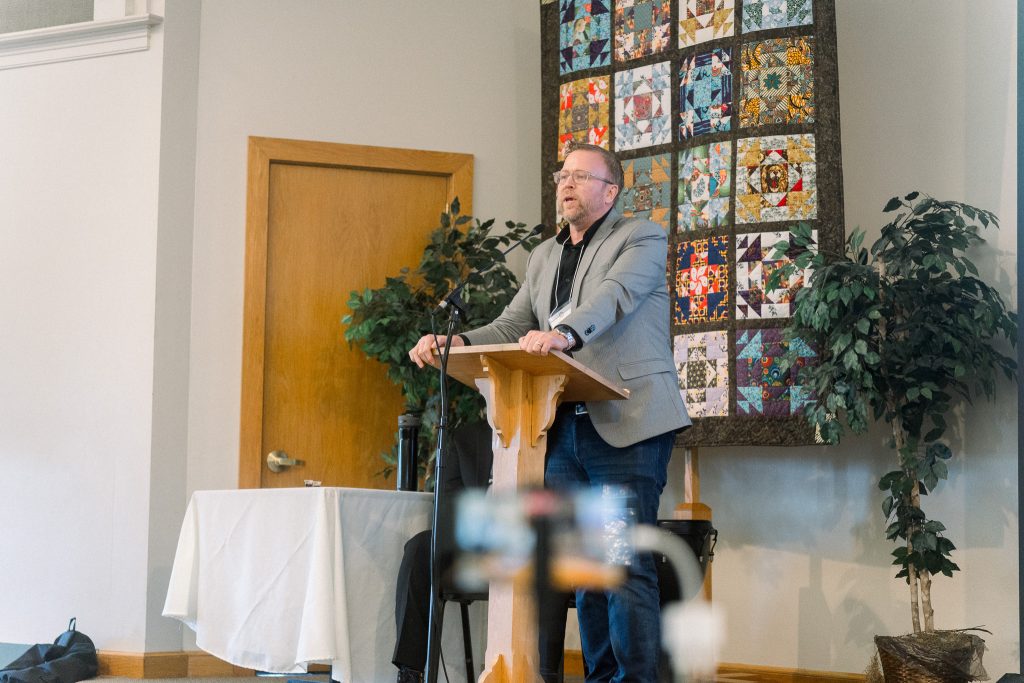
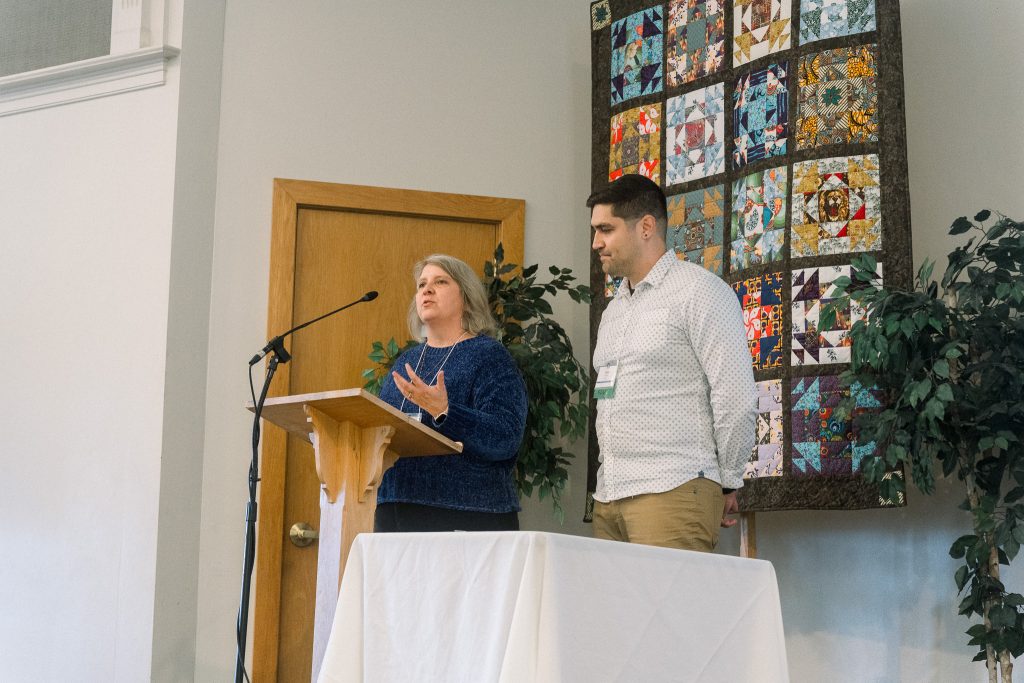
Kriss committed to the delegates a sense of transparency, “to be as clear as we can about the process…We want you to know what is happening and what is true.” Kriss then gave the floor to Carlson and Guyton to address the delegates.
Carlson acknowledged that for many people, “at times, it feels like to be Mennonite is to spend an awful lot of time explaining ourselves,” and yet we want our church to be a safe place where we can “quit explaining ourselves and just be…When there becomes a need to explain ourselves within church, it’s easier to just separate and create a new space.”
Carlson added, “My sense is that Mosaic has spent a lot of time needing to explain yourself to those in denominational leadership… your approach to multicultural ministry, your growth pains…and it’s exhausting.”
He continued, “I believe there is space for welcoming and belonging for every part of Mosaic within MC USA if that is where you want to be…I am open to doing the work of figuring out what are the structures that give us life, what are the areas of friction and disagreement, and where current structures aren’t serving us well, how can we update and modify those.”
Guyton shared some of his journey to becoming a Mennonite. “If I can belong in this institution for 31 years, I know that there is a place for anyone. God has called me to this place, and I pray that you find the place God has called you to.”
The delegates discussed at table groups the grief or challenges that they personally, their congregation or their CRM would experience with a redefined relationship with MC USA, and the signs of hope and life, as they look to the future of Mosaic.
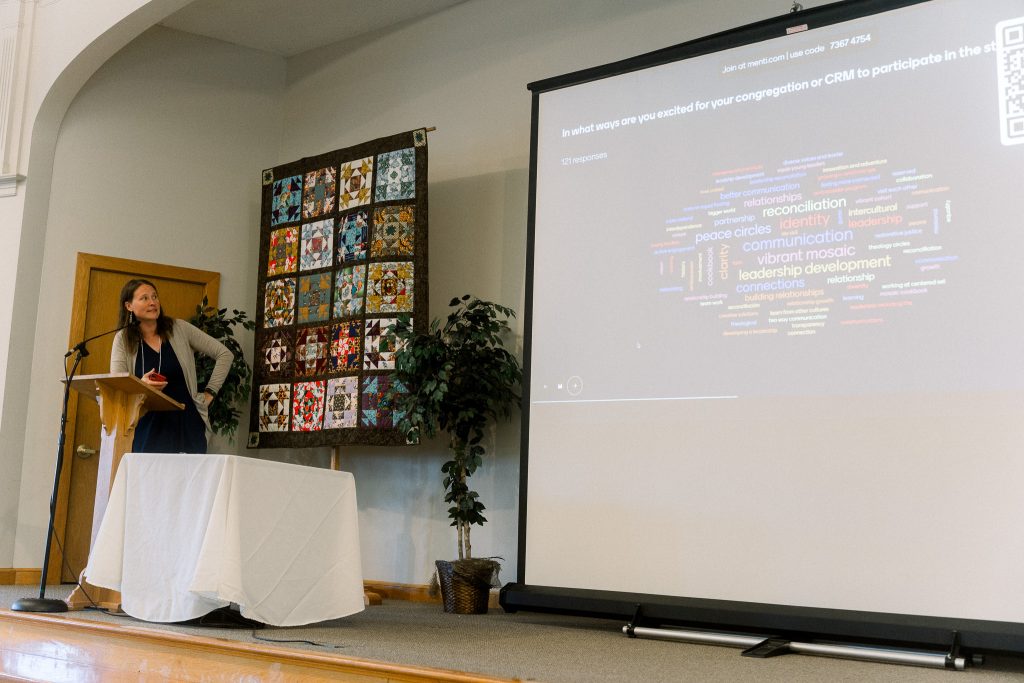
Delegates were then asked to vote on the ballot, which read: “To affirm, with gratitude, the work and recommendation of the Pathway Steering Team to establish a robust partnership with Mennonite Church USA, and to bring recommended bylaw amendments for delegate discernment at the 2025 Mosaic Conference Assembly.”
The ballot item is a request from the delegates to the Mosaic board, which the board will need to carry out with MC USA during the next year. The voting process used a green-yellow-red system to more effectively hear dissent.
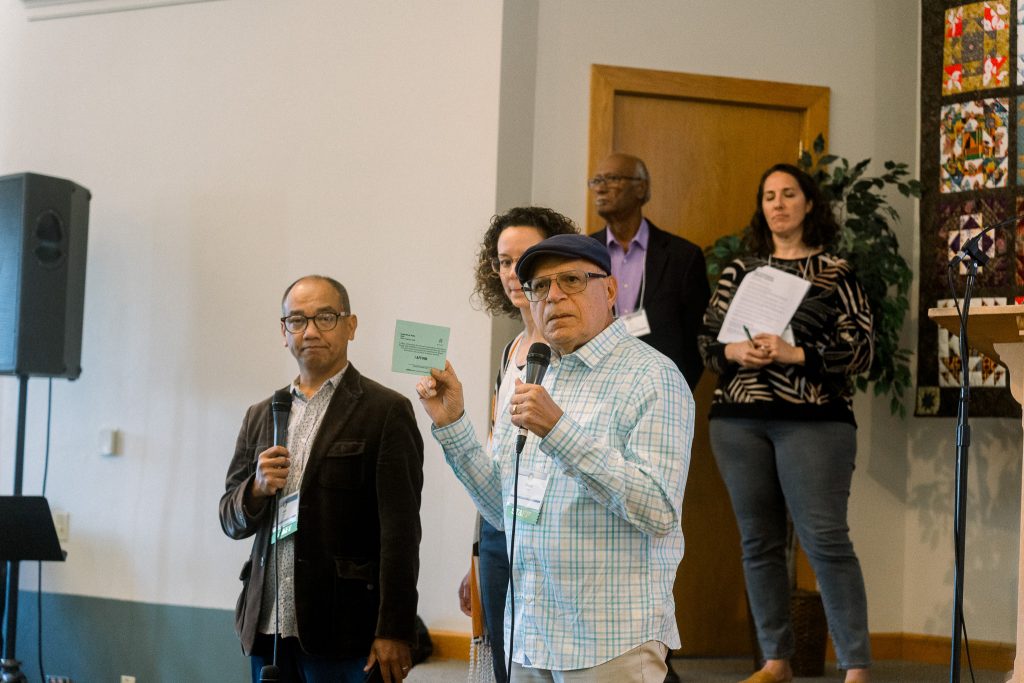
The vote passed with 71% affirmation, which means that Mosaic Conference leadership will be working toward defining a relationship of partnership with MC USA.
MC USA has previously stated that “conversations related to partnership are ongoing and likely require MC USA delegate approval.”
“Continued dialogue with MC USA leadership is very important, so that we don’t just splinter and cut each other off,” Moderator-Elect Roy Williams said, reflecting after Assembly. “We are made of many parts – it’s in our name – and how we move forward in exploring partnership will shape us as a Conference moving forward, too. My challenge to MC USA and to Mosaic is how can we improve the relationship that we have.”
Mosaic Conference materials for delegates provided some information about the concept of partnership with MC USA: “We identify as Mennonites and desire an ongoing relationship with MC USA to help ground us in the Anabaptist story. At the same time, reducing the time spent struggling with MC USA structure and policies will allow Mosaic’s leaders to focus on our strategic plan, conference priorities, and identity work. We acknowledge that this change will not resolve the differences in our congregations around human sexuality and we are committed to discerning our conference posture as an early step in implementing our strategic plan.”
There were 69 delegates (40%) who voted “I affirm,” 52 (31%) who voted “I affirm with reservation,” 34 (20%) who voted “I do not affirm,” and 15 (8%) who abstained (according to Mosaic Conference bylaws, abstentions are counted as “no” votes).
Acknowledging the variety of perspectives of delegates, Mosaic Conference Moderator Angela Moyer Walter said, “Some of us are excited, some are confused, sad, or angry, and God is with us in this journey.”
“There is a clear sense of trust and affirmation from the delegates for the discernment and recommendation of the Pathway Steering Team,” Moyer Walter said, when reflecting on the vote after Assembly. “And yet as we have seen throughout the Pathway process, a breadth of diversity in perspectives and experiences within Mosaic. We are taking all the feedback heard throughout Assembly to the board meeting later this month and it will shape our way forward.”
*This article was updated on 11/7/24 to reflect the language written on the cards used for the vote.
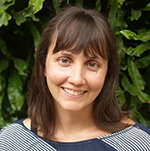
Jennifer Svetlik
Jennifer is Editor & Development Coordinator for Mosaic. She grew up near Houston, TX and spent a decade living in intentional community in Washington DC, before moving to Lansdale, PA with her spouse, Sheldon Good. She is a graduate of the University of Texas and Washington Theological Seminary. She serves as Children’s Faith Formation Director at Salford Mennonite (Harleysville, PA). Jenn has two elementary-school-aged children and loves biking, camping, gardening, and vermicomposting with her family.
The opinions expressed in articles posted on Mosaic’s website are those of the author and may not reflect the official policy of Mosaic Conference. Mosaic is a large conference, crossing ethnicities, geographies, generations, theologies, and politics. Each person can only speak for themselves; no one can represent “the conference.” May God give us the grace to hear what the Spirit is speaking to us through people with whom we disagree and the humility and courage to love one another even when those disagreements can’t be bridged.
This post is also available in: Español (Spanish) Indonesia (Indonesian)
This post is also available in: Español (Spanish) Indonesia (Indonesian)
